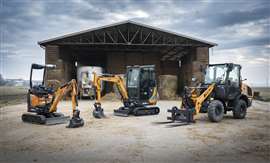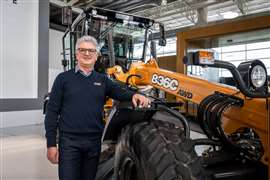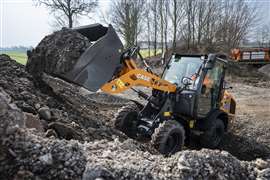Interview: CNH exec talks about innovative Case financing program
23 September 2024
CNH Industrial, owner of Italy-based construction equipment manufacturer Case Construction Equipment, has been actively targeting the rental industry through its dealer network for some time. Now a new initiative promises to take some of the risk and burden of machine ownership off of fleet owners. IRN’s Lewis Tyler investigates.
 The entire portfolio of Case equipment is on offer within the new ‘rental mechanism’ program. (Photo: Case CE)
The entire portfolio of Case equipment is on offer within the new ‘rental mechanism’ program. (Photo: Case CE)
Through its new ‘rental mechanism’ program, CNH Industrial is offering longer-term, less-expensive rentals of Case equipment to customers through its dealers.
In an interview with International Rental News (IRN), Graziano Cassinelli, global head of rental and VP Europe sales at CNH Industrial, explains that the program has been “customized for dealers and for rental companies,” with dealers providing the machines which remain part of the CNH Capital finance.
“We have prepared a tool jointly with CNH Capital, which is our financial organization, where we have made 24-, 36-, 48-, or 60-month rental available.
“Why this program is super innovative is because it allows three important features. The first is allowing the possibility for the dealers, rental companies or customers to end the contract before the ending.”
The second, he says, is the value method used by the company, which bases the value of the machines on commercial value, as opposed to the financial value; “We have created a presentation which considers the real value of equipment, not the financial value, which is much lower.
“Basically, the operating lease is normally going to make the calculation for the rental rate using the very conservative value.”
He continues, “There’s a real commercial value that allows the receiver to get a long-term rental at very low cost. If the rental period is finished in a period of time before it is terminated, the customer can decide if they want to buy the equipment or if they want to give back the machines to CNH.
“There are few financial organizations that give you the tools considering the commercial value of equipment, all of them consider the residual value which is more of a financial buyback.”
Low risk rental
Previously the company offered what he describes as “normal financing,” where 12- or 24-month options are made available through dealers. Once the contract ends under this scheme, the machine is owned by the client. That is still available and going well.
 Graziano Cassinelli, global head of rental and VP Europe sales, at CNH Industrial. (Photo: Case CE)
Graziano Cassinelli, global head of rental and VP Europe sales, at CNH Industrial. (Photo: Case CE)
“This is different,” says Cassinelli, who previously worked for most of his career with Caterpillar and its dealers.
“Rental mechanism, as we call it, is a way to rent with flexibility at a low cost. The risk is taken by CNH and not by the customer or dealer.”
He says the company, which recently inaugurated an electric compact wheel loader production line in Lecce (see related story), has already trialed the program in Europe, with it being available currently in Iberia, France, Germany and the UK.
Initial feedback has proven positive, especially with rental companies. He highlights two reasons for that.
First, as the machines are held on the balance sheet of CNH Capital, they are not showing on the balance sheet as additional debt for the rental company. Secondly, it enables them to keep the machine, while also allowing them to exit the agreement without penalty.
“Think about when someone has to exit from leasing a car, for example,” he says. “You have a huge penalty to pay. In this case it is just the administrative cost to close the contract and to close the relation with the supplier.”
Choose from entire portfolio
In terms of fleet, the entire portfolio of Case equipment is on offer, while Cassinelli says New Holland, a fellow subsidiary of CNH Industrial, is ready to roll the program out in its construction line.
The company is also running an “active campaign” through rental mechanism customized for electric mini excavators in the 1.5- and 2.5-tonne range. Cassinelli describes it as a “very aggressive campaign from 24 to 60 months with a very low rental rate for dealers and rental companies.”
As well as the machines, the company also offers maintenance to customers, but rental companies are also given a separate option.
He says, “We mostly maintain and repair the machines, except for the rental company with which we have a solution that offers the machines without the maintenance and repair, meaning the rental company can do the repairs and the maintenance by themselves following our instructions.”
Meanwhile, he says the program will enable both the company and New Holland and CNH Dealers to reach more of the rental market.
“We want to have more rental companies buying Case and New Holland products and that’s why we have worked a lot not just on the products but even on the in the financial side, allowing them to try Case products without any risk because they can make a very simple comparison.”
Rental market
Taking some of that risk away is another reason he believes it will prove popular, given that the company is noting that some rental companies are putting off CapEx on fleet due to uncertainty around the current economic climate, although some normally invest around January or February.
He says more companies are spreading investment “in a more conservative way” than before.
Looking ahead, he expects the program to be as successful as its Case dealer rental program, but admits that it’s still early days; “We know we have the experience over the last few months in Spain, but of course we need to implement it through the network to our people, promoting the product to the customer and the dealer and this will take a little bit of time.
“I’ve seen many programs in my rental life, but there aren’t many that share the risk with the rental company.”
 Case launched the 12EV, an electric compact wheel loader, earlier this year. (Photo: Case CE)
Case launched the 12EV, an electric compact wheel loader, earlier this year. (Photo: Case CE)
The importance of compact machines
The rental mechanism program comes at a time in which Case is increasing its investment in both electric equipment and its compact range.
In July, the company opened a production line for its electric compact wheel loader range at its plant in Lecce, Italy.
The electric compact wheel loader will be marketed under the Case and New Holland brands and distributed worldwide.
Cassinelli tells IRN that although every line is important for the company, its compact range is “really important for many reasons.” He says, “First, because the compact line is European manufactured. All the mini and midi excavators are manufactured in Italy. It’s something that belongs to the, I would say, European P&L.
“And second, because on compact, when you talk about Case, for example, the skid steer or backhoe loaders, we are talking probably the most well-known product from Case in the world.
“So we are talking about one of our war horses, our most popular products that everybody knows in every point in the world.”
STAY CONNECTED



Receive the information you need when you need it through our world-leading magazines, newsletters and daily briefings.
CONNECT WITH THE TEAM






